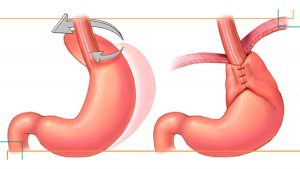Index or BMI body mass determines if you are in a state of obesity or overweight, through a calculation that divides your weight or your height. If your BMI is greater than 30, it is because you suffer from obesity, but there are surgeries to end this disease.
La cirugía bariátrica, It consists of various types of methods to lose weight, the most laparoscopic (less invasive surgery).
One of the most common is the adjustable gastric band, that lap-band, which involves placing a band that fits on top of the stomach (through the laparoscope), dividing them into two, and letting small portions of food through it.
This will make greater satiety have, comas preventing many times to the day, and that the metabolic process faster to having less food to process.
But another more modern and effective method, It is the gastric bypass surgery: Your doctor may do a bag on top of the stomach and the small intestine directly connect this bag; preventing food from passing through the rest of the stomach, where absorption occurs food.
Other types of bariatric surgery, They are sleeve gastrectomy and biliopancreatic with duodenal, all through laparoscope. Making small cuts in the stomach to enter it, and having a faster and less painful recovery.
To make any of these surgeries, You must meet certain requirements. Not every obese or overweight person can receive bariatric cigrugía.
Moreover, most patients undergoing surgery, It is because obesity has produced them (or you are at risk) other diseases such as diabetes type 2, heart problems or high pressure.
Mostly they are subjected to a diet guided by a medical specialist, coupled with physical exercises. If this does not help you lose weight, and would bariatric surgery option.
So, If you've already tried to exercise and diet, and you have obtained no results, ask your doctor for a possible operation.




